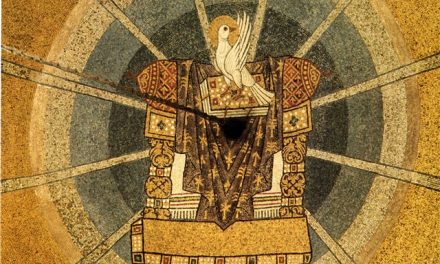The Baptism of the Lord
Lectionary #21
Isaiah 42:1-4, 6-7
Psalm 29:1-2, 3-4, 3, 9-10 (11b)
Acts 10:34-38
Matthew 3:13-17
Why did Jesus ask to be baptized by John? The Baptism of the Lord didn’t make a lot of sense to the early followers of Jesus who worried about the fact that it seemed to suggest that Jesus was somehow subordinate to John the Baptist. Two thousand years later, the Church has developed a very substantial theology of the sacrament of baptism, but that theology is not very helpful for the task of understanding the Baptism of the Lord either. Catholics believe that baptism imparts the grace of forgiveness of sins, and marks our initiation into the Church. But Jesus didn’t need to be forgiven nor can we really say that by his baptism Jesus became part of the church. The gospel itself doesn’t give us very much to go on. The only explanation offered by Jesus regarding why he should be baptized by John is: “Allow it now, for thus it is fitting for us to fulfill all righteousness.” But that explanation doesn’t get us very far.
The final line of this Sunday’s reading from Matthew’s gospel offers perhaps a better clue about the meaning of Jesus’s baptism. That line reads: “This is my beloved Son, with whom I am well pleased.” There we hear an unmistakable echo from the first reading: “Here is my servant whom I uphold, my chosen one with whom I am pleased” (Isaiah 42:7). By making this connection, the author of Matthew is testifying to the fact that Christians had come to believe that the “Suffering Servant” in Isaiah ultimately refers to Jesus Christ. It is Jesus who will be the definitive “covenant of the people” and “light for all nations.” He will “open the eyes of the blind” and “bring out prisoners from confinement, and from the dungeon those who live in darkness.” I have always been moved by those images of the mercy of Christ. They can be taken quite literally of course – Jesus Christ as liberator, freeing those unjustly bound or confined in darkness. But they can also speak to Jesus rescuing those of us held in the bondage of sin or trapped in lives marked by an existential darkness. As another Christmas fades into the past and we prepare to move on next week to ordinary time, these readings help us to understand more fully the meaning of the incarnation – of why Christ has come. As Pope Francis noted in a recent general audience, the good news of the incarnation is not merely that God has taken on human flesh, but that God has done so in a world “marked by so many things, good and bad, marked by divisions, wickedness, poverty, arrogance and wars.” Jesus has come to bring God’s mercy to the world.
What can these readings tell us about the meaning of our own baptism? The Catechism of the Catholic Church tells us that “Through Baptism we are freed from sin and reborn as sons [and daughters] of God; we become members of Christ, are incorporated into the Church and made sharers in her mission” (CCC #1213). Just as Matthew’s gospel makes a connection between the Baptism of the Lord and the mission of the suffering servant, we too should make a connection between our own baptism and that same mission. Having been baptized into the Body of Christ, we too are called to his ministry of mercy.
Finally, these readings also point to the importance of humility. Indeed it seems that humility plays a part in the “righteousness” that Jesus refers to when he asks John to baptize him. The reading from Acts also points to the importance of humility when Peter states that “In truth, I see that God shows no partiality.” The meaning of Peter’s discourse in the house of Cornelius can only be understood by reading what comes before the passage proclaimed for this Sunday. Peter had been an advocate of the view that Christianity was only for Jews (i.e., to become a Christian one must also become a Jew). He had come to change his mind and to recognize that Jesus Christ came for Gentiles too. We might conclude that we should not dwell on the fact that baptism makes us part of a holy people. Instead, our baptism might be understood primarily as a calling to embrace the mission of Christ and the suffering servant to go out into the world and “heal all those oppressed by the devil.”




